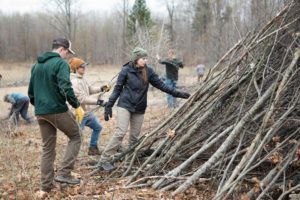OTG Volunteers Needed: Edge-feathering and Brush Pile Building at Bellevue Conservation Club
MUCC’s On the Ground Program is excited to be partnering with the Bellevue Conservation Club. Volunteers are needed on February 3, 2024, at 9:00 AM to help create edge-feathering and build brush piles at the Bellevue Conservation Club. To register for the event, click HERE.
The Bellevue Conservation Club (BCC) was established in 1928. Since then, they have been committed to bringing together community members and surrounding areas to ensure the sustainable use and preservation of our country’s natural resources. BCC works hard to improve habitat for wildlife and fish on their land. They have established a forest management plan through MSU, created and continue to maintain food plots, and built wheelchair-accessible blinds for the DNR’s Disabled Veterans Deer Hunt. The club has a wide range of ideas for future projects as well that will benefit Michigan’s fish and wildlife. BCC is eager to offer more hands-on opportunities for their members and surrounding communities to make a difference in conservation. We need our dedicated OTG volunteers to help make our first event at the Bellevue Conservation Club a success.
Although it may not seem like glamorous work, edge-feathering and brush piles provide important habitat for wildlife. Edge-feathering creates gradual edges with a mix of plants of varying heights between grassland and woodland. A gradual transition between two habitat types makes edges more hospitable for local wildlife. To create an edge, trees and vegetation are thinned. Trees are selectively cut. This means trees that have less value to wildlife are removed and mast-producing trees that provide a food source for wildlife like oaks and walnuts are left standing. The down material from edge-feathering can then be used to construct brush piles. We like to call brush piles “rabbitat” because they create ideal rabbit habitat. These piles provide great shelter for small mammals, nest sites for game birds, and hunting grounds for hawks, weasels, and foxes. The combination of gradual edges and brush piles provides escape cover, nesting and rearing sites, food sources, and thermal cover in the winter.
The down material from edge-feathering can then be used to construct brush piles. We like to call brush piles “rabbitat” because they create ideal rabbit habitat. These piles provide great shelter for small mammals, nest sites for game birds, and hunting grounds for hawks, weasels, and foxes. The combination of gradual edges and brush piles provides escape cover, nesting and rearing sites, food sources, and thermal cover in the winter.
If you are looking for a way to improve habitat and help wildlife this winter, please join us for our upcoming OTG project at Bellevue Conservation Club. We provide all necessary equipment, lunch, and a volunteer gift to registered volunteers. For more information or questions about OTG email our Habitat Program and Partnerships Coordinator at sscheitz@mucc.org.
Recent Posts



